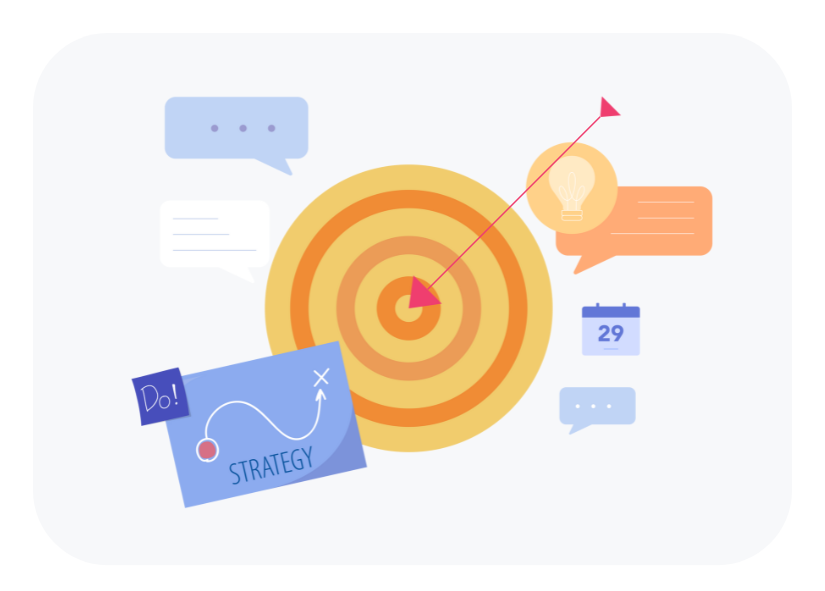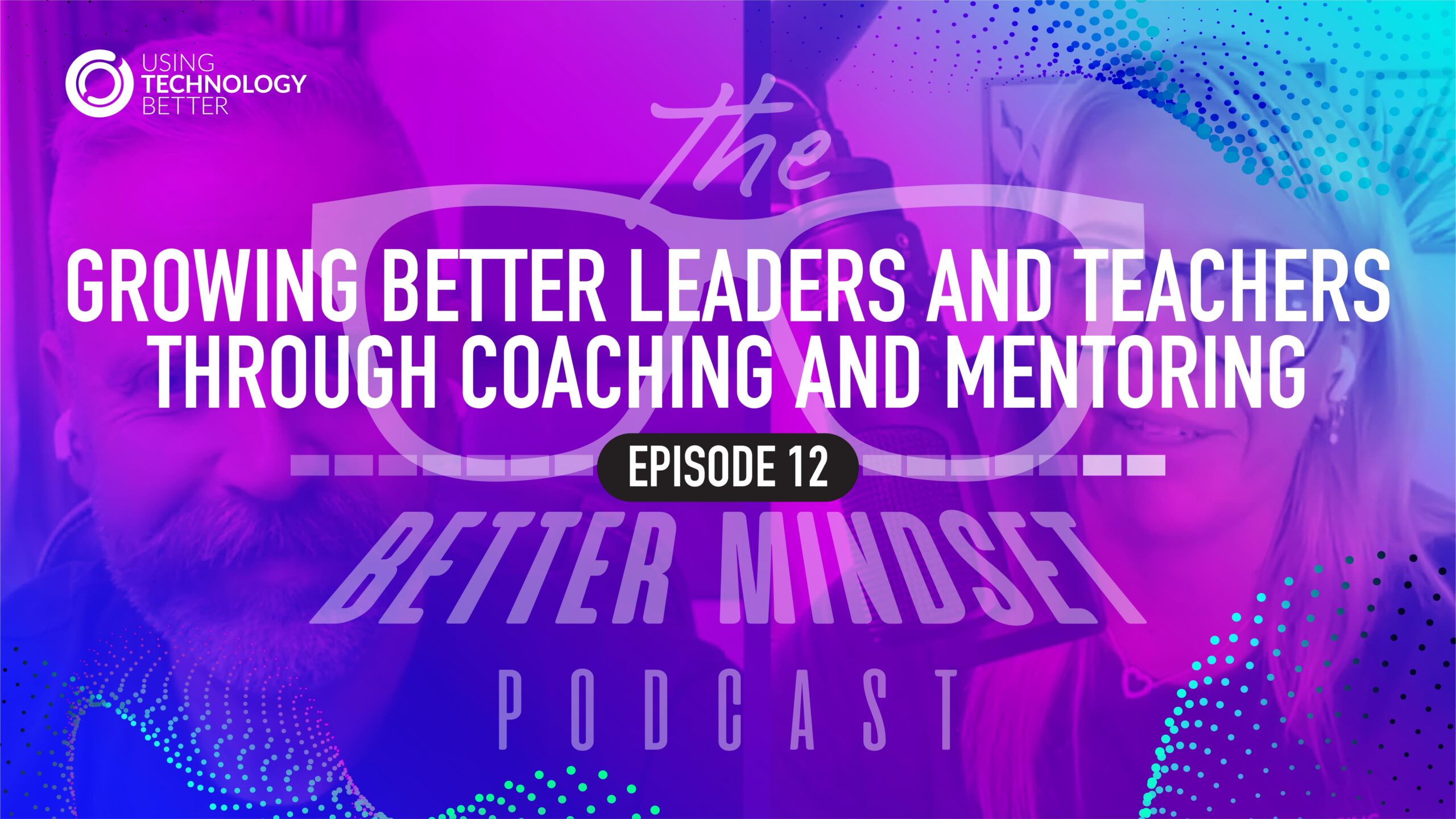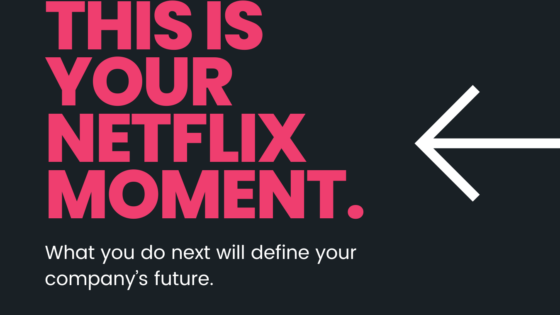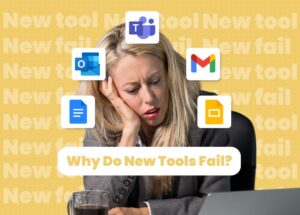In this episode, we explore the differences between coaching and mentorship. While both are powerful tools for personal and professional growth, they have distinct approaches and outcomes. We dive into the characteristics of each, including the level of structure, guidance, and relationship-building involved. Our guest speakers share their experiences and insights on when coaching or mentorship may be more appropriate and how to best utilise each to achieve your goals. Whether you’re a seasoned professional or just starting out, this episode will provide valuable insights on which approach may be right for you.
We post every week and would love to have you keep up with us. If you know someone who would get value from these episodes, hit the share button and let them know. Lastly, if you have questions or anything to share with us, email us at team@usingtechnologybetter.com. You can also contact Bex at bex@usingtechnologybetter.com to find out how you can get free PD in your schools (NZ) or follow us on Instagram at @usingtechnologybetter or on youtube.com/@utb
We’d love to hear from you! See you next week.
Chapters:
Podcast Transcript Podcast Below:
Bex Rose: 0:00
Ultimately, the key to successful coaching and mentoring is building relationships based on trust 100% in open communication, and as leaders, it’s our responsibility to create a culture that values and supports both coaching and mentoring, I think this place for both the better mindset podcast
Mark Herring: 0:21
Welcome to the better mindset Podcast. I’m Mark Herring. And I’m Bex Rose. And this is Episode 12, a podcast where our aim is to help you be better school leaders and teachers, and to drive effective digital change in your schools on today’s episode, making waves in schools today is the potential for coaching to build our capacity and skills, BEX, and I discussed the differences between coaching and mentoring and the opportunities for these approaches with your team. Alright, on today’s making waves, because you’ve got something for us today, yeah.
Bex Rose: 0:54
So today, we’re gonna talk about coaching versus mentoring. And I know you’ve been both mark. And I know it’s worked for us both and what we prefer. So I’m going to talk a bit about how they differ but also how they’re both super important when you’re in the schools or in any type of institutions. So, as a leader, I’ve been set, I’ve seen firsthand benefits of coaching and mentoring. So both of these practices are essential to support the growth and development of our students and teachers. So however, there are some significant differences between the two. So we’re going to unpack what they look like today and and how you can implement aspects of both coaching or mentoring and your leadership practice. So let’s start with coaching. Because I’m not I’m not favoritism, but it is my favorite. So coaching. So coaching was something I was introduced to, really early on in my leadership journey, so so we’re just going to unpack what it is first. So coaching is a short term relationship between a coach and a coach, ie with a focus on improving specific skills or achieving specific goals. So coaching sessions are usually structured with a clear with clear objectives and timelines, and often involve feedback and accountability. And the model that I’ve used in my time has the acronym growth, which takes you through the process of coaching, your coaching. So coaching can be incredibly powerful, because it provides the space for individuals to reflect on their practice and identify areas of growth. So it really gives that sense of power to the coach, IE as opposed to the coach. Coaching can be incredibly powerful, because it provides a space for individuals. And it can also be an opportunity to learn new strategies, and receive constructive feedback, and practice skills in a supportive environment. Because the coaching is really relationship driven and as and that’s a key area at the beginning is to really build that relationship with your coachee. So I was introduced to it early on, as I said before my leadership career and a bit of background was that I was quite a young dp and I was surrounded by incredible, incredible leaders across across the board and teachers and my staff. So I kind of felt like I was this new person like coming in and, and who was I to know, because I was pretty young as well. So I got put through a series of coaching, leadership sessions, and got learn how to just basically provide the framework to have these growth coaching conversations with my staff or with teachers across the Kol. And it was a really cool opportunity for me to feel like I could really help people around me because ultimately, that’s what I wanted to do. But I wanted to do it. I had a structure to be able to do that. And all I had to do was ask the right questions at the right time to help them work out where they needed to go next. Yeah, yeah. And that’s something we do in our certified leadership program to write so much on a talk to the way in which we coach.
Mark Herring: 4:21
Yeah, coaching. I wasn’t really around when I started teaching, either it was something that was happening probably incidentally, or just over those cups of coffee in the staff room. But over the last three to four years, I think really in the last two years, that’s where it’s become really popular, particularly in schools, but across you know, all industry areas. And it’s like what you say it’s a real opportunity for people to be able to develop their own capability and their own strength that’s that. I like to think of that analogy of, of not giving people fish but actually giving them a fishing rod. And so really what you’re doing is you’re helping them to learn how to fish you’re helping them to think through The process for themselves, you’re asking those key questions that when you’re not there, the person is enabled to be able to do that thinking for themselves. And it’s a really, really powerful tool on the leadership program that we do, we use it as a way to scaffold the application of the content that we give people. So we’re great at finding all of the leadership content, the frameworks, the concepts and the content that people can use to be able to help them in their leadership journey in the school. But then it’s the application of that that often misses, you know, and that’s where I think the learning sometimes doesn’t quite gel or doesn’t really stick. But if we’re in a coaching situation, where we’re able to prompt them and you know, ask them those guiding questions, ask them the five why’s and, and really dive deep into things. And that’s when they can start to make the connections between the content that we’re giving them and their actual context. I think that’s really where I see it being really valuable,
Bex Rose: 5:55
totally, and really empowering for them, because they feel like they’ve come up with their solutions. And then you’re more inclined to follow through with those ideas, because you kind of feel like you’ve come up with them. And that’s how I felt as a coachee. As well as like, Ah, okay, cool, I kind of got that I got to this point on my own, you know, with the coaching out, but you kind of felt like, rather than being told what to do, you’re being helped to find the way forward on your own. I think the other thing about coaching was that was really important to have those touch points, those those regular cadence of touch points in coaching, and we made it really clear, and our staff that we would make that a priority in our staff meeting time, because otherwise, it becomes something that is another add on. And another thing to do. So every four weeks, we do three, three, the three weeks would be working on strategic goals that we’re working on. And then the fourth week would be the coaching session. And so that cadence was regular, and mean that you knew that you had to have that conversation with your coach every four weeks, so you didn’t do something, you got that accountability points. But also you had dates that you knew how to get stuff done by and that is where the magic happened for me in terms of coaching was that I had made short succinct goals, kind of like that 12 week working year thing where it was like, by the end of the week, I’m going to do this and it didn’t have to be massive, but it meant that it was it got traction and the goals and it meant that I had done one little next step for the next thing. And it was it was where I started seeing some real traction in my growth. So massive fan of coaching, as you can probably hear that I’m going to talk about mentoring now. So mentoring, on the other hand, is as a long term relationship between a mentor and a mentee. And it’s got a focus of personal and professional development. So unlike coaching, mentoring is less structured and the mentor takes more of a holistic approach to supporting the mentor, the mentee. So Mentoring can be incredibly beneficial because it provides people with a role model and a sounding board. And I know that at the beginning principals always get the view their mentor to begin with, and it just gives them you’ve been in the scenario before, like, tell me what you did in this moment. So mentors can offer that guidance and support and advice base based on their own experiences and expertise. So their mentees, their their mentees? Not mentees, mentees often develop that sense of loyalty and trust, but towards their mentor, which can be powerful motivator for growth and development. So there’s a there’s that real sort of like sense of, I don’t know, looking up to them, and really trusting what they have to say and really trusting that they’re giving them advice that are going to help them in their own space. So the question is, I guess, Have you have you been? What what do you think, Mark? Like you’ve been probably in both situations? How have the experiences differed for you? Like what is something that you can take from from mentorship that perhaps you do in your own leadership? Practice as well?
Mark Herring: 9:19
Yeah, there’s, there’s a couple of thoughts, one of them, I think, it’s, it’s really easy to get the two mixed up, because they are so similar in the way, you know, effectively, it’s a conversation and it’s a contact point with another person. And I think sometimes when you’re in a coaching situation, you might be mostly coaching. So asking questions, that’s how I would define it. Because I remember I remember having to ask somebody a while ago, you know, what’s the difference between coaching and mentor? I didn’t really kind of understand we were new to coaching in the company, particularly and but but really, you’re actually doing both sometimes, you know, you might be in a coaching phase, but then there’s a mentor situation that might take over so there’s a conversation where you’re you are in a place to be able To give advice or, you know, this is what I did when I was in that place, or have you thought about, you know, those types of questions. So in any one particular conversation, whether it’s formal or informal, it might be conversational and coaching base, but then you might flip into mentoring mode, and then vice versa as well. Sometimes I think the best mentors who have been there done that blaze the trail, and they are guiding someone, you know, along the pathway, they may using may use a coaching approach. So I think it can can kind of depend on, you know, the situation and the experience levels of the people involved. But I think from a leadership perspective, when we’re working with leaders in schools, usually they’re engaging with us as a company, because they want to see some change, they want to see, you know, digital transformation in the school, they want to see some innovative practice, they want to improve their culture, they want to improve, improve their processes, and systems and those types of things. So there’s some change element that they’re trying to get, you know, into their school. What we often hear as a default system is that as leaders, they think, right, I need to get this change happening, I’m going to give them some content and some training. So I’m going to get them all in a room, and I’m going to give them what they need. And then that will affect the change. And there is a time and place for that. But I think a lot of leaders aren’t recognizing the power and potential of the coaching mentoring approach to really develop some internal capacity in your team, because there’s so much power that can, that can be gained by little touch points over a period of time when people are continually being brought back to a goal or being guided and scaffolded in that way. And I think as as leaders, if we’re able to find a way in our schools to set up, you know, a formalized structured coaching approach, where you have two people connecting with each other to two teachers that are colleagues, you know, that are coaching each other, and you need to give them training to be able to do that. But, you know, give them guiding questions, those types of things, give them the time, like you were saying in a meeting space, but also looking like I think probably I think a lot of schools are realizing that, you know, most schools that we go into now, when we say one of our favorite approaches to be able to build capacity is the coaching approach, and we’ll talk about that. But what I reckon Beck’s is missing, too, is exactly what you’re talking about in the mentoring space. I don’t know that we’re giving those experienced teachers, the teachers who I would sort of describe as the lead teachers in the school, the opportunity and maybe the permission to be connected with those younger teachers, those inexperienced teachers in a way that can guide them and put them into that formal mentoring process. I wonder if there’s a trick there that we’re missing in the schools for that to be able to be a thing?
Bex Rose: 12:43
Yeah, I think there’s a capacity thing. Yeah. Because I think people are just tapped out with everything that they have to do on their own classes. And there is that but getting teacher model where you have your associate teacher for two years, and I think that’s a really important component. I agree with you. I think having someone that’s lived the shoes have been in the shoes and giving that advice can be really, really beneficial. But I have to admit when I had, yeah, it’s how you do it like, and it’s also war stories don’t work, war story, hearing war stories over and over again. And this is what happened. And also think about even five years ago, when we’re in schools to what we’re doing now. Types of change, and the changes are super fast. So your context that you have, when you’re beginning principal, would be completely completely different to what they’re dealing with today. Like completely different. And so so there is there is that whole Yep, you’ve been you’ve, you’ve been a principal for 25 years. That’s awesome. But it was very, very different. When you started being a principal to what it is today. Like think of even just the communication with parents think of the the way that parents interact with schools 25 years ago than they are today. I just truly think that that that mentoring does, yeah, it definitely does have its place, but also coaching can really draw out the best in people and draw out your game. Yeah, you you’re in the role for a reason as as a teacher or as in leadership. So you’ve got the ideas there somewhere. And I think the coaching draws it out because it gives it that space for you to think because there’s not very, it’s not very often that you actually have that time to really think about your practice or pedagogy, your goals. You’re kind of like I’m doing this and I’m doing this and I’m doing this, and then I’m gonna mentor meeting, I’m hearing all the things that I need to do and you’re like, how the heck am I going to do that? And then you get, you know, so it’s, it’s that space that I think is the key component to really make it work. Yeah, I haven’t. So mine’s actually, I do look up to people that I must admit, like coming into this role is very different to what I tried. I was a trained teacher, and now I’m working at a completely different facet of a career, you know, like it’s completely different. And I’ve got a best friend who I talked to and he He rolls me through a whole bunch of different things in the business world. And if I didn’t have his voice in my head or his, his his learnings across the business side of things, I’d be screwed. I love listening to what he has to say, and he and that mentor role. So, and that’s not coaching, that’s just telling me the ins and outs of business. And what happens, which is mentoring. Yeah. Which is mentoring. So yeah,
Mark Herring: 15:21
yeah, I agree with everything you’re saying. I think it’s about using the best of the both approaches. And so you know, like you’re saying, because the context is continually changing. And we’re facing different challenges, like the challenge that all teachers are facing with AI, and how you how you move through that landscape, nobody really knows what that means. So there is nobody who can mentor you through that, effectively. And that so that’s the place of coaching, I think that’s, you know, being able to ask questions, you know, well, why is that an issue? Okay, tell me more about that. What does that mean for you? What are the implications, you know, digging deeper, though, all of those coaching techniques. But I think I think the place that mentoring has is, like you’re saying, with your friend in the business space, if you’re able to connect with experienced educators who may not have faced the same challenges that you’re facing, but they’re able to help you apply the same principles that guided them through the challenges that they faced, that can help you with this, you know, stuff, it’s principle based, or values based off things like putting the student first, or thinking about the long term vision or you know, about considering all stakeholders, all of those types of things that sometimes, as leaders in the modern school, we can forget, you know, that we’ve like, it’s so easy to forget about listening to parents and taking their consideration on board. You know, it’s so easy to forget about the fact that, you know, we need to put students first because we can get caught up in everything that we’re doing, you know, where we have demands of curriculum and assessment needs, and all those types of things. So, yeah, it’s about both of them working together, isn’t
Bex Rose: 16:48
it? Yeah, yeah. So I think that ultimately, the key to successful coaching and mentoring is building relationships based on trust, and open communication. And as leaders, it’s our responsibility to create a culture that values and supports both coaching and mentoring, I think there’s place for both when I was feeling coached, I felt the sense of urgency and pressure to improve specific skills or achieve specific goals. And I appreciated that direct feedback and accountability that came with coaching. But at times, it can be a bit intimidating. What when I was mentored and coached through my career, I can say from personal experience is a big difference of how I was filling mentored versus house coach, I could look to the mentor for guidance and support. I appreciated the wisdom and insight that came from my mentors, years of experience, and I often felt inspired or motivated by our conversation. So there’s definitely there’s definitely a need for both the very valuable in both ways. And as a leader, I think it’s important to recognize the unique needs of each individual and provide them with the appropriate support and guidance to help them grow and develop.
Mark Herring: 17:54
Very cool. Excellent, thanks. Thanks. That’s great. Cool. All right, Episode 12 bits. What are your final thoughts before we wrap? Yeah,
Bex Rose: 18:04
so in this podcast, we looked at the key differences between coaching and mentoring. So coaching typically involves that short term goal orientated approach where the coach guides the coachee towards achieving the specific outcome. While mentoring involves a longer term relationship focused on developing the mentee skills, and knowledge and sharing experiences and offering advice. So coaching is more directive with the coach asking questions and providing feedback. And the mentoring is more supportive with the mentor offering guidance and acting as a sounding board. But both Coaching and Mentoring can be valuable approaches for personal and professional development. And understanding the differences between the two can help individuals choose the approach that best suits their needs,
Mark Herring: 18:51
if you’re after some of the links or resources that were mentioned, or if you want to reach out to us, connect with us, if you want to do some coaching with us or develop your own coaches, we’d love to hear from you have a look in the show notes, and you’ll see some of those links. And also make sure that you subscribe we publish every Wednesday, and we’re up to episode 12. Now back to that magic 21 number. When they reached 21, you’ve reached the top 1% of all podcasts. So we’re over halfway there. We’re getting there. If you know someone who’d get some value from this podcast, whether it’s the coaching discussion in the mentoring discussion, share the podcast with them, send them the link, let them know about it, retweet some of our social posts, we’d love to get the word out there and hit the share button to be able to do that. And subscribe to us like we said before and lastly, if you have questions or anything you’d love to share with us, email us at team at using technology better.com We’d love to hear from you soon. And one last little call out if you’d like to jump on a live coaching call if you’ve got some some issues that you’re grappling with, we’d love to have you on a future segment of coaching. So we’d love to hear from you as well. See you all next week. See you later.

















